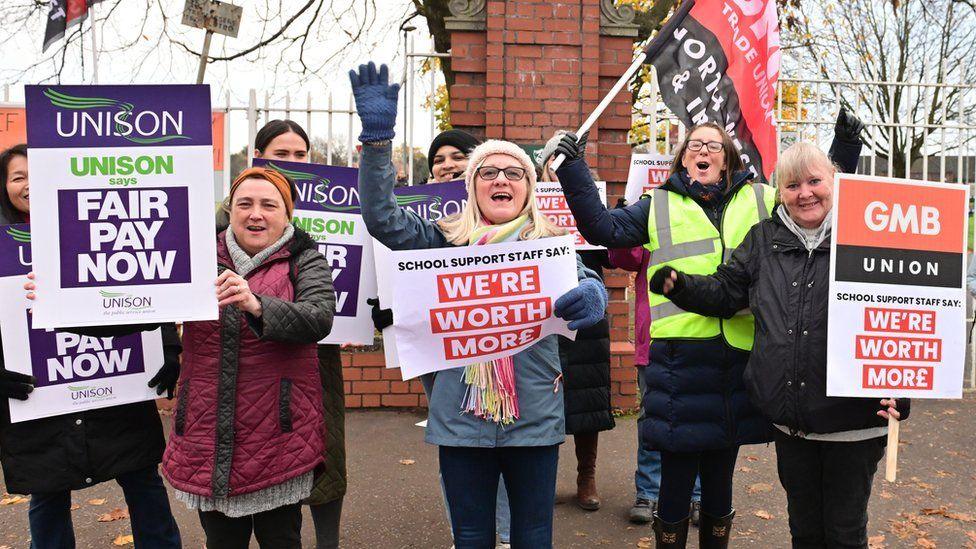School strikes: How and why schools will be affected

School bus driver Thomas McMichael is set to strike on Monday
- Published
"There's a fair bit of responsibility for a very minimum wage."
School bus driver Thomas McMichael is among thousands of non-teaching staff in the Education Authority (EA) set to strike on Monday.
Education workers including bus drivers, classroom assistants and canteen staff are taking action for several days during May and June.
Workers in the Unite, GMB and Nipsa trade unions are walking out as part of a long-running dispute over pay and job grading.
The Education Authority (EA) said the strike action would "cause significant disruption" to special schools.
It said about eight schools were expected to close and five to partially close, would result in about 250 EA (yellow) buses not running and would impact on about 20% of children entitled to a free school meal.
How will the strike affect schools?

Principal Jonathan Gray said he expected his school to stay open but some pupils may have problems getting transport
Many schools across Northern Ireland will be affected, especially those who rely on EA buses to get pupils to and from school.
However, some special schools will be hit the hardest and some may have to close to pupils on strike days.
That is because special schools rely particularly on staff like classroom assistants to provide support to pupils and on transport provided by the EA.
Jonathan Gray is the principal of Arvalee Special School in Omagh, County Tyrone.
He told BBC News NI that he expected Arvalee to stay open but some pupils may have problems getting transport to school.
"We can't guarantee transport will be available for the children," he said.
"We're based in Omagh, we have a very wide catchment area so transport is key.
"It's also part of their routine. The drivers are an important part of our children's lives."
'Outstanding job'
Mr Gray said non-teaching staff are crucial and he said resolving the pay dispute was crucial.
"Many of my classroom assistants have to work two jobs so that they can provide for their families as well as do the job they love," he said.
"This has to come to some sort of resolution because they are worth the money."
What are the rates of pay?
School support staff are among the lowest paid in the education system.
Some jobs for classroom assistants are currently advertised by the EA at about £12 per hour.
Jobs for school bus drivers and catering staff are available at roughly the same hourly rate.
The pay and grading review would lead to improved pay scales and wages.
Why has the dispute not been resolved?
The dispute over the pay and grading review has been running for a number of years and has led to a number of previous walkouts.
But it now comes down to the 2024/25 Stormont budget.
In a letter to schools about the strike the Department of Education (DE) permanent secretary Dr Mark Browne said it would "have a significant detrimental impact on our children and young people, particularly the most vulnerable children with special educational needs".
Dr Browne said that to implement the review and award back pay from April 2022 would cost DE around £180m and then £90m a year going forward.
"When the executive met to set the budget, given numerous other competing pressures they did not have the funding required to implement these changes," his letter said.
"Consequently, it was agreed that the minister of finance should seek approval from the Treasury to bring forward funding set aside under the agreed funding package for future years to allow for additional funding to be accessed in 2024-25.
"The minister of finance is currently making that case and we await a decision from London."
But he added that "taking industrial action in Northern Ireland at this time will not resolve this issue and will only cause further damage to the education of our children".
He also raised concerns that some children taking GCSEs, AS and A-Level exams could have their transport to school disrupted.
How do those striking feel?

Workers are walking out as part of a long-running dispute over pay and job grading
Thomas McMichael is a school bus driver with the EA but is also a representative with the Unite union.
"We carry special needs kids and we carry mainstream as well," he told BBC News NI.
"You've got them in your care, you're driving a five-tonne bus in and out of estates and you've children behind you you're responsible for as well.
"So there's a fair bit of responsibility for a very minimum wage."
Mr McMichael said his union and others had been taking "on and off" strike action for about two years due to the dispute over pay and grading for non-teaching staff.
The pay and grading review would mean changes to pay grades and scales for some job roles, and overall would lead to pay rises for workers currently on low pay.
Mr McMichael said he, like many others, was "struggling to get by".
Many staff like him are only paid during the school term.
"I get paid for 47 weeks out of 52 and the hourly rate is squashed down to be spread across it," Mr McMichael said.
"So I'm currently on £11.79 an hour which is 35p ahead of the minimum wage of £11.44.
"We're carrying the, and I don’t like using the term, the most precious cargo in the world - children - and we're paid basically the lowest."
'Struggling to get by'
The EA board - which oversees the authority - recently heard that pay issues within the school catering service "were having a negative impact on staff retention".
Mr McMichael said that he was seeing a similar problem among bus drivers.
"There's a recruitment and retention issue because we have people leaving," he said.
"I've spoken to drivers there recently, one of them in particular was 20-odd years in the Education Authority.
"He loved the job but he couldn't afford to stay.
"You're constantly watching what you can spend on and you're struggling to get by."
He also said that strikers were very aware of the disruption caused to children missing school, especially those with special educational needs.
"This isn't just about us looking more money, this is about trying to save the services for both parents and ourselves."
What has the Education Authority said?
“The Education Authority said it would "work closely with schools to try and mitigate the impact of the strike action as far as possible"
"However, we remain very concerned about the disproportionate impact this will have on our children and young people, particularly those with special educational needs, those sitting exams and those from the most socially deprived areas."
The statement added: “We remain fully committed to delivering the pay and grading review.
"However, we simply don't have the money to proceed at this time and a resolution is outside of our control.
“Therefore, given the impact this will have on the most vulnerable pupils, we would call on colleagues to defer this action and allow the executive time to continue their engagement with the UK government about securing the additional funding necessary to implement the EA pay and grading review."
Related topics
- Published16 November 2023

- Published14 May 2024
